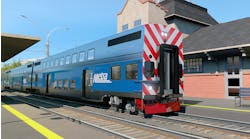Huawei Hosts Asia Pacific Railway Summit 2016 in Hong Kong
Huawei hosted the Asia Pacific Railway Summit 2016 in Hong Kong on March 23. The event, which was themed "Leading New ICT: Building a Better Connected Railway", drew in more than 100 railway decision makers and professionals from 10 countries to share best practices and discuss the trends and challenges shaping rail development.
In his welcoming speech, Yuan Xilin, president of the transport sector of Huawei's Enterprise Business Group, commented on the disruptive effect of technology on the industry. "New technologies with cloud computing at the core are changing the railway industry. Huawei has accordingly been actively promoting the development and application of these open technologies, such as LTE, Internet of Things (IoT), cloud computing, Bring Your Own Device (BYOD), and agile networking, to help railways transform the roles of their ICT systems from supporting elements to key production components,” he said.
“Huawei pursues a strategy of ‘being integrated’, through which it collaborates with partners to build a developer-defined ecosystems through joint innovation,” Yuan continued. “Together with its customers, Huawei not only facilitates innovation but also the building of more secure, efficient, and sustainable railway systems that provide passengers with comfortable and convenient travel experiences. In view of these wide ranging benefits, we are committed to building a business-driven ICT infrastructure for the railway industry, helping our customers garner commercial advantages through digitalization; and empowering smart, service-oriented, and well-managed railway transportation systems.”
It is Huawei’s firm belief that a successful railway transportation system is based on the effective coordination of infrastructure, vehicles, and personnel. Thus, as their railways continue to develop in scale, global operators must think of new ways to organize resources and improve operating efficiencies.
Speaking at the summit, Richard C S Wong, Principal Fellow, Systems & Technology Group, Vice President and Head of Systems at Singapore Mass Rapid Transit (SMRT), offered his thoughts on how operators can harness technology in overcoming these challenges. He said: "Nowadays, wireless communications services are increasingly embraced by the railway industry as they eliminate the need for complicated cabling work and significantly reduces signal interference to communications equipment. Meanwhile, train-to-train communications and the positioning of trains is made easier with wireless and ICT-enabled railway signal systems. This provides passengers with full connectivity to trains, making travel more convenient and enjoyable."
In the era of mobile internet, passengers demand comprehensive information, business, and entertainment services during their journeys. Commenting on this trend, Xu Shupeng, Senior Director, Mechanical Engineering of Zhengzhou Rail Transport Company, opined on the benefits of full connectivity: "With an eLTE network in place, Zhengzhou Metro has been able to implement real-time high definition video surveillance on trains. This means that traffic data can be analyzed in real time, which allows better control of train operation and situations on trains,” Xu said. “Therefore, when an accident occurs, we are able to respond immediately to ensure the safety of passengers and trains. Moreover, eLTE provides a high quality-of-service assurance to the passenger information system, allowing passengers to watch uninterrupted real-time videos, thereby improving their travel experiences. Such services also lay the foundation for future deployment of mission-critical applications, such communication-based train control, broadband trunking, and value-added high-speed internet service."

